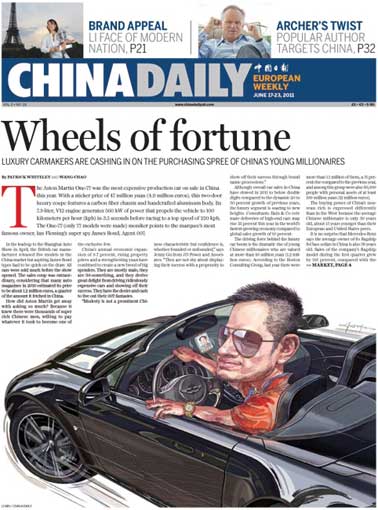Op-Ed Contributors
Setting some records straight
Updated: 2011-06-18 07:34
By Shujie Yao (China Daily)
China has to create, not replicate, and ensure that its firms succeed overseas if it wants to become a truly big power
China may have overtaken Japan as the world's second largest economy earlier this year, but its efforts to create a compelling business environment for Chinese multinationals in developed economies lags far behind that of its eastern neighbor. The failure of China to emulate Japan or South Korea in developing world famous brands such as Toyota or Samsung highlights the weaknesses in its domestic economic structure, which continues to dent its global competitiveness.
There is evidence, though, that China's "go-global" strategy is gathering momentum. According to Asia Society, Chinese overseas direct investment could reach $2 trillion by 2020.
China's further economic growth is tied to the fate of its multinationals. If Chinese companies fail to create an impact on ultra-competitive Western markets, then it is highly unlikely that China will sustain its rapid economic growth for another 20 or 30 years.
The uncomfortable truth is that Chinese State-owned enterprises (SOEs) lack experience of genuine competition. For SOEs, profits have been too easy to come by. Last year, the combined profit of China's two most profitable SOEs was equal to that of the largest 500 private companies.
The SOEs lack incentives to innovate and develop technological expertise capable of rivaling Western giants. Unlike South Korea and Japan, China has a seemingly limitless domestic market and its companies can record impressive growth without crossing borders.
I have met with the chairmen of two of China's largest private companies, both of whom were among the country's top five richest men according to the Hurun Wealth Report. Neither has ever had any plan to enter the developed markets overseas, for they fear high risks, and are handicapped by poor technology and products that often fail to meet minimum quality standards of the European Union.
Besides, private enterprises in China lack State support, and find it difficult to expand their business scale and, more crucially, get bank loans. The discrimination that still plagues the private sector in China is reflected in the fact that two-thirds of all bank loans are channeled to the public sector, even though it accounts for only 15 percent of the country's employment.
Graduates and other highly qualified people are lured by the prestige and higher pay that working for government organizations and SOEs in China bring. Many people join the private sector as a last resort. Salaries in the public sector are 1.8 times higher than in the private sector, and a government job offers attractive pension and far greater job security.
China's global march has centered on energy deals and mergers and acquisitions (M&As). It has enjoyed great success in ensuring stable supply of natural resources, securing loans-for-oil deals and buying majority stakes in Western mining companies. M&As do help accelerate China's push into Western markets. But how long can such a strategy be sustained? M&As carry high price tags, and China is not yet adept at managing the purchased assets.
The takeover of Volvo by Chinese carmaker Geely is a case in point. It has given China little access to technology, because all the innovation engineers in the company are non-Chinese. Furthermore, the M&A strategy deflects attention from the need to develop strong Chinese brands, which would command respect abroad and restore the credibility of the made-in-China label, to which safety scandals have dealt frequent blows.
Lenovo, the fourth largest computer-maker in the world, is perhaps the only Chinese company that comes closest to a truly global brand. Yet the headline of a recent profile of Milko van Duijl, Lenovo's senior vice-president, in the UK-based Daily Telegraph read: "Lenovo: the biggest computer-maker most people have never heard of".
It is the responsibility of Chinese officials to translate the ambitious promises set out in the 12th Five-Year Plan (2011-2015) into action. China's rapid economic development has been largely based on exports and low-level manufacturing of consumer goods, thanks to cheap labor and technologies imitated or imported from the developed world.
The officials should start implementing the promises by establishing an incentive mechanism to encourage greater domestic competition and allowing private enterprises to compete fairly with SOEs. The government should take measures to make it easier for private companies to get bank loans, and set up a tough regulatory regime to ensure SOEs do not enjoy unfair monopoly.
Can China succeed in hauling itself up the technological ladder? It can, but the process will be painful and lengthy. The country still has a large reserve of cheap labor in rural areas, which means the pressure for innovation and technology upgrade has not reached its peak.
China's total GDP may well surpass that of the United States by 2020, but its per capita GDP will still be less than one-fourth of the US. In other words, even when China becomes the largest economy in the world it will remain a developing country.
For China to become a rich and truly powerful nation, Chinese multinationals have to flourish overseas. Without respected brands of its own, China will always languish at the lower end of the value chain. And its future will ultimately depend on its ability to create, not replicate.
The author is a professor of economics at the University of Nottingham.
(China Daily 06/18/2011 page5)
E-paper

Pret-a-design
China is taking bigger strides to become a force in fashion.
Lasting Spirit
Running with the Beijingers
A twist in the tale
Specials

Mom’s the word
Italian expat struggles with learning English and experiences the joys of motherhood again.

Lenovo's challenge
Computer maker takes on iconic brand apple with range of stylish, popular products

Big win
After winning her first major title, Chinese tennis star could be marketing ace for foreign brands
